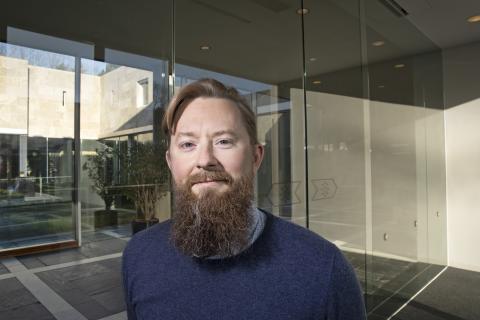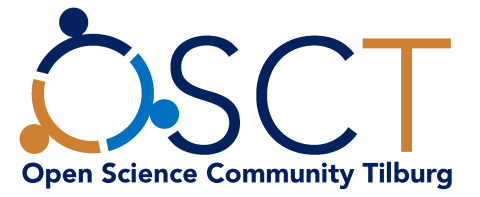How to deploy an Open Access Journal
Regulatory scholars Ronald Leenes and Aaron Martin have been busy establishing their fully Open Access Journal titled Technology and Regulation (or TechReg), and were supported by the TiU Open Science Program. What does it take to set up a journal? We asked Aaron Martin, managing director and postdoc at Tilburg Law School.

"What we do is cutting-edge. Tech law and regulation is a weird space, but increasingly important and more and more topical. There is stuff happening every day that is super relevant to society.”
Dr. Martin, together with prof. Ronald Leenes, who acts as the Editor-in-Chief, you launched the new Journal TechReg approximately a year ago. How is everything going so far?
“In May 2019 we had a ‘soft launch’. The Open Journal System’s account we use as a publishing system was already running at the time, but we were still formalizing the workflow and the personnel. If you use it well, the platform captures the conversations with authors and reviewers. You need editors and an editorial board committee, and you need the journal to become familiar in the academic field. A big biannual conference was coming up, so we made sure a few articles were online by then. This way we could present the journal at the venue, which helped to get things going. Since then things have gone well, we have received a surprising number of submissions. We’ve received dozens of articles.”
It sounds as if everything went very smoothly…
“Well, the Open Journal System we use needed tailoring and customizing. The platform is good, but not without occasional hiccups. And also we needed to learn about this new system. OJS has given us good support. I have to say that there are easier platforms available, where you do not need to do anything really—plug and play. But Ronald and I like to get into the technique. We also needed to make the Adobe software work for production and to deal with the footnotes and so on, but it gets easier.
"We don’t want to be another academic journal on data protection."
The hardest part is to get the right people involved and to establish the right identity and online presence. We think you can do this only once. We received many articles, but not every article really discussed what we like to bring up with TechReg. Often the topic is law, privacy and data. That is fine, but we are looking for something different and that is why we also had to refuse some good legal contributions. That can be hard to do. We are looking for a more interdisciplinary or multidisciplinary approach, for instance coming from a sociological or anthropological perspective on regulation and technology. For us, regulation and technology includes questions of society, culture, ethics, climatology and philosophy and so on. We don’t want to be another academic journal on data protection, although the GDPR has made this topic very popular at the moment. Surely, we will publish data protection related publications, but we want to keep a broad view. Now we have got a really good team of editors, I think, who are giving us the right identity.”
A new journal needs to build reputation and trust. Was it hard to convince people to publish in TechReg?
“Ronald and I are not experts in everything, but with time and effort we are able to find the right reviewers. We also wanted to provide a much quicker review and publishing procedure, but this is difficult. Reviewers are humans. They have families and jobs. The pandemic has affected everyone’s availability, and understandably so. We would like to publish things within three months of submission if good enough. The reality is that if a good reviewer is thorough and takes an additional couple of weeks to provide a review, then it is fine. I think the four or five-month turnaround we have now is still pretty damn good.
People come to us in the first place because they realize that the old model is broken, because some of the obvious outlets make the final article inaccessible to most readers. We've actually received feedback from one author who made a value-based judgment and said: I want to publish with you all, even if there are risks, and I want to get going with the new kids on the block, because this is important. That was great. We had submissions from all over Europe, also from the Scandinavian countries with a very good science tradition. We cannot hide behind paywalls anymore. I often get calls from colleagues with the request to review something. My first question is if the proceeding or article will be open access. I do not want to let people down, but I will not do it for a publisher such as Springer or Routledge asking 180 dollars for a book.”
What do you think will be the future of TechReg as Open Access Journal? Now it is a so-called ‘diamond’ open access journal, which means the authors do not have to pay any ‘article processing charge’ for an accepted publication. Do you think you can maintain this policy in the next years?
“We received financial support from the Open Science project of Tilburg University, and without this we have to discover how we can support ourselves. In an earlier mission statement, we wrote somewhere that we would never ask for APCs. We think that when money becomes involved in scholarly publishing, it will lead down a scary path. We first want to build reputation and to become findable in the Directory of Open Access Journals. Most important is to secure our existence, and we are aware that we are playing the long game here. I am actually incredibly hopeful that we will find funding in the future. We did not launch this journal without a serious sort of review of the outlets that currently exist and their deficiencies. There are only a couple of journals doing similar things, but they are student-run or closed access, or very American and without a strong peer review model. What we do is cutting-edge. Tech law and regulation is a weird space, but increasingly important and more and more topical. There is stuff happening every day that is super relevant to society.”
Photo: Ton Toemen

Join the Tilburg University Open Science Community
Talk and learn about open science practices, get practical advice, connect with other Open Science Communities
